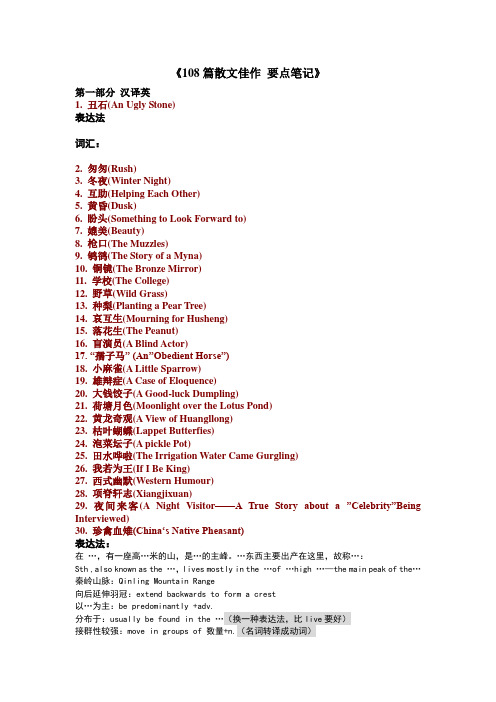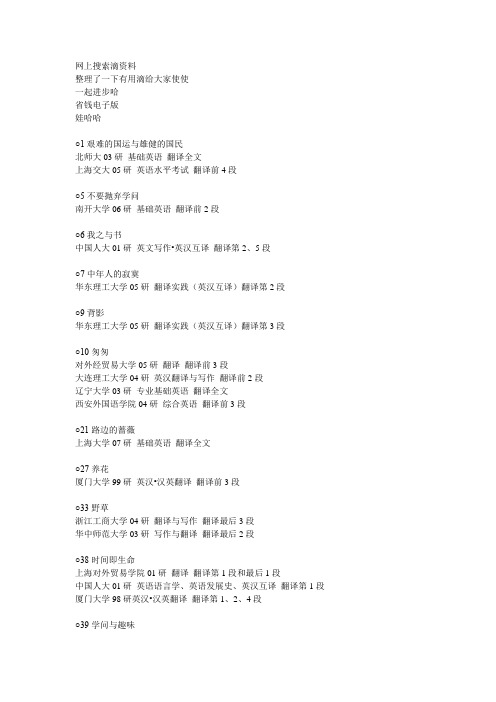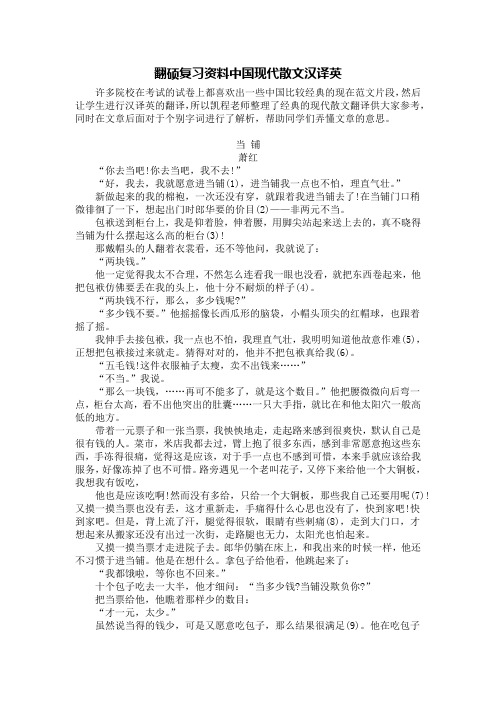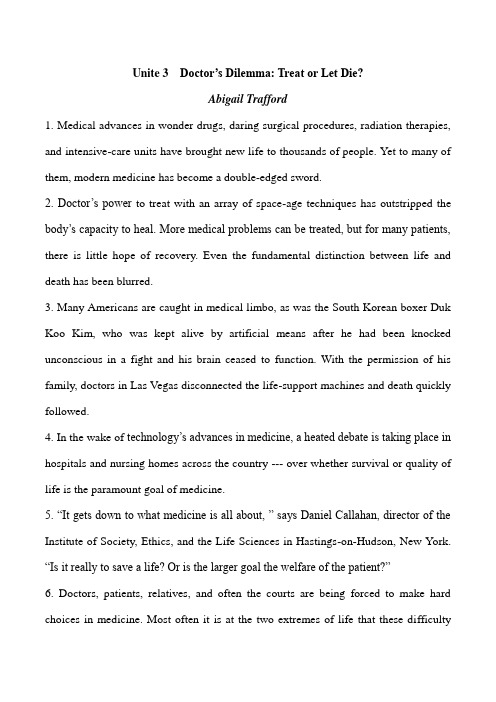翻译硕士汉译英散文选《哀互生》
考研英语翻译解密技巧资料108篇要点笔记解析

《108篇散文佳作要点笔记》第一部分汉译英1. 丑石(An Ugly Stone)表达法词汇:2. 匆匆(Rush)3. 冬夜(Winter Night)4. 互助(Helping Each Other)5. 黄昏(Dusk)6. 盼头(Something to Look Forward to)7. 媲美(Beauty)8. 枪口(The Muzzles)9. 鸲鹆(The Story of a Myna)10. 铜镜(The Bronze Mirror)11. 学校(The College)12. 野草(Wild Grass)13. 种梨(Planting a Pear Tree)14. 哀互生(Mourning for Husheng)15. 落花生(The Peanut)16. 盲演员(A Blind Actor)17. “孺子马” (An”Obedient Horse”)18. 小麻雀(A Little Sparrow)19. 雄辩症(A Case of Eloquence)20. 大钱饺子(A Good-luck Dumpling)21. 荷塘月色(Moonlight over the Lotus Pond)22. 黄龙奇观(A View of Huangllong)23. 枯叶蝴蝶(Lappet Butterfies)24. 泡菜坛子(A pickle Pot)25. 田水哗啦(The Irrigation Water Came Gurgling)26. 我若为王(If I Be King)27. 西式幽默(Western Humour)28. 项脊轩志(Xiangjixuan)29. 夜间来客(A Night Visitor——A True Story about a ”Celebrity”Being Interviewed)30. 珍禽血雉(China…s Native Pheasant)表达法:在…,有一座高…米的山,是…的主峰。
2020翻译硕士复习资料:散文翻译(4)

2016翻译硕士复习资料:散文翻译(4)美文妙译林语堂的Moment in Peking当中描写慈禧太后的句子:1. The ignorant old woman who ruled for the entire last half of the nineteenth century did more than any other single person to hold back China’s progress. Without her the progressive Emperor Kuangshu would certainly have gone on with his reforms. To the end, the Emperor, like an eagle deprived of its wings, remained submissive to his aunt. Ignorance added to a strong character was a double curse; stupidity joining hands with stubbornness was twice stupid.张振玉先生的译文:那个愚蠢无知的老太婆统治了19世纪的后50年,使中国不能进步,她可算功劳第一。
若没有她,锐意求进的光绪皇帝,一定会进行他的维新大计。
光绪皇帝,像个剪去翅膀的苍鹰,一直对他这位大权在握的老伯母必恭必敬,百依百顺。
愚而妄,其为祸则加倍地强烈。
愚蠢再与刚愎携手,则愚蠢倍增。
【spoiltcat点评】最后一句实在是经典。
“愚蠢无知”来译ignorant,有点过,因为ignorant 似乎并无“愚蠢”之意。
苍鹰不是一个一个的吧。
“必恭必敬”尚可表现出无奈的感觉,“百依百顺”则不可。
【spoiltcat改译】那个无知的老太婆在19世纪后半叶统治中国整整50年之久。
阻止中国进步的第一大功臣,当真非她莫属。
历年考过的张培基散文中的翻译段落

网上搜索滴资料整理了一下有用滴给大家使使一起进步哈省钱电子版娃哈哈○1艰难的国运与雄健的国民北师大03研基础英语翻译全文上海交大05研英语水平考试翻译前4段○5不要抛弃学问南开大学06研基础英语翻译前2段○6我之与书中国人大01研英文写作•英汉互译翻译第2、5段○7中年人的寂寞华东理工大学05研翻译实践(英汉互译)翻译第2段○9背影华东理工大学05研翻译实践(英汉互译)翻译第3段○10匆匆对外经贸易大学05研翻译翻译前3段大连理工大学04研英汉翻译与写作翻译前2段辽宁大学03研专业基础英语翻译全文西安外国语学院04研综合英语翻译前3段○21路边的蔷薇上海大学07研基础英语翻译全文○27养花厦门大学99研英汉•汉英翻译翻译前3段○33野草浙江工商大学04研翻译与写作翻译最后3段华中师范大学03研写作与翻译翻译最后2段○38时间即生命上海对外贸易学院01研翻译翻译第1段和最后1段中国人大01研英语语言学、英语发展史、英汉互译翻译第1段厦门大学98研英汉•汉英翻译翻译第1、2、4段○39学问与趣味北京外国语大学07研基础英语翻译最后2段南开大学04研基础英语翻译第3段○41黎明的北京中国地质大学06研翻译与写作翻译第1、2、7段以及第6段最后3句○42 文学批评无用论中国人大01研英文写作•英汉互译翻译第2段(不必译最后2句)○44母亲的回忆西安外国语学院02研翻译与写作翻译最后3段○45巷对外经贸大学06研专业英语(翻译理论与实践)翻译第4、6、7段附:题源出自《英译中国现代散文选•第三辑》(张培基译注,上海外语出版社2007年11月出版)○16别了,贺年卡北京科技大学06研基础英语翻译第3段。
翻硕英译中国现代散文选

翻硕英译中国现代散文选落花生 我们屋后有半亩隙地。
母亲说:“让它荒芜着怪可惜,既然你们那么爱吃花生,就辟来做花生园罢(1)。
”我们几个姊弟(2)和几个小丫头都很喜欢——买种的买种,动土的动土,灌园的灌园;过了不几个月,居然收获了! 妈妈说:“今晚我们可以做一个收获节(3),也请你们的爹爹来尝尝我们底新花生,如何?”我们都答应了。
母亲把花生做成好几样食品(4),还吩咐这节期要在园里底茅亭举行。
那晚上底天色不大好(5),可是爹爹也来到,实在很难得!爹爹说:“你们爱吃花生吗?” 我们都争着答应:“爱!” “谁能把花生底好处说出来?” 姊姊说:“花生的气味很美。
” 哥哥说:“花生可以榨油。
” 我说:“无论何等人都可以用贱价买它来吃;都喜欢吃它。
这是它的好处。
” 爹爹说:“花生底用处固然很多;但有一样是很可贵的。
这小小的豆(6)不像那好看的苹果、桃子、石榴,把它们底果实悬在枝上,鲜红嫩绿的颜色(7),令人一望而发生羡慕的心。
它只把果子埋在地底,等到成熟,才容人把它挖出来。
你们偶然看见一棵花生瑟缩(8)地长在地上,不能立刻辨出它有没有果实,非得等到你接触它才能知道。
” 我们都说:“是的。
”母亲也点点头。
爹爹接下去说:“所以你们要像花生(9),因为它是有用的,不是伟大、好看的东西。
”我说:“那么,人要做有用的,不要做伟大、体面的人了。
”爹爹说:“这是我对于你们的希望。
” 我们谈到夜阑才散,所有花生食品虽然没有了,然而父亲底话现在还印在我心版上。
PeanutsXu Dishan Behind our house there lay half a mou of vacant land. Mother said, “it’s a pity to let it lie waste. Since you all like to eat peanuts so very much, why not plant some here?” that exhilarated us children and our servant girls as well, and soon we started buying seeds, ploughing the land and watering the plants. We gathered in a good harvest just after a couple of months! Mother said, “How about giving a party this evening to celebrate the harvest and inviting your Daddy to have a taste of our newly-harvested peanuts?” We all agreed. Mother made quite a few varieties of goodies out of the peanuts, and told us that the party would be held in the thatched pavilion on the peanut plot. It looked like rain that evening, yet, to our great joy, father came nevertheless. “Do you like peanuts?” asked father. “Yes, we do!” we vied in giving the answer. “Which of you could name the good things in peanuts?” “Peanuts taste good,” said my elder sister. “Peanuts produce edible oil,” said my elder brother. “Peanuts are so cheap,” said I, “that anyone can afford to eat them. Peanuts are everyone’s favourite. That’s why we call peanuts good.” “It’s true that peanuts have many uses,” said father, “but they’re most beloved in one respect. Unlike nice-looking apples, peaches and pomegranates, which hang their fruit on branches and win people’s admiration with their brilliant colours, tiny little peanuts bury themselves underground and remain unearthed until they’re ripe. When you come upon a peanut plant lying curled up on the ground, you can never immediately tell whether or not it bear any nuts until you touch them.” “That’s true,” we said in unison. Mother also nodded. “So you must take after peanuts,” father continued, “because they’re useful though not great and nice- looking.” “Then you mean one should be useful rather than great andnice-looking,” I said. “That’s what I expect of you,” father concluded. We kept chatting until the party broke up late at night. Today, though nothing is left of the goodies made of peanuts, father’s words remain engraved in my mind. 注释: 本文是许地山(1892-1941)的名篇。
翻硕复习资料中国现代散文汉译英

翻硕复习资料中国现代散文汉译英许多院校在考试的试卷上都喜欢出一些中国比较经典的现在范文片段,然后让学生进行汉译英的翻译,所以凯程老师整理了经典的现代散文翻译供大家参考,同时在文章后面对于个别字词进行了解析,帮助同学们弄懂文章的意思。
当铺萧红 “你去当吧!你去当吧,我不去!” “好,我去,我就愿意进当铺(1),进当铺我一点也不怕,理直气壮。
” 新做起来的我的棉袍,一次还没有穿,就跟着我进当铺去了!在当铺门口稍微徘徊了一下,想起出门时郎华要的价目(2)——非两元不当。
包袱送到柜台上,我是仰着脸,伸着腰,用脚尖站起来送上去的,真不晓得当铺为什么摆起这么高的柜台(3)! 那戴帽头的人翻着衣裳看,还不等他问,我就说了: “两块钱。
” 他一定觉得我太不合理,不然怎么连看我一眼也没看,就把东西卷起来,他把包袱仿佛要丢在我的头上,他十分不耐烦的样子(4)。
“两块钱不行,那么,多少钱呢?” “多少钱不要。
”他摇摇像长西瓜形的脑袋,小帽头顶尖的红帽球,也跟着摇了摇。
我伸手去接包袱,我一点也不怕,我理直气壮,我明明知道他故意作难(5),正想把包袱接过来就走。
猜得对对的,他并不把包袱真给我(6)。
“五毛钱!这件衣服袖子太瘦,卖不出钱来……”“不当。
”我说。
“那么一块钱,……再可不能多了,就是这个数目。
”他把腰微微向后弯一点,柜台太高,看不出他突出的肚囊……一只大手指,就比在和他太阳穴一般高低的地方。
带着一元票子和一张当票,我怏怏地走,走起路来感到很爽快,默认自己是很有钱的人。
菜市,米店我都去过,臂上抱了很多东西,感到非常愿意抱这些东西,手冻得很痛,觉得这是应该,对于手一点也不感到可惜,本来手就应该给我服务,好像冻掉了也不可惜。
路旁遇见一个老叫花子,又停下来给他一个大铜板,我想我有饭吃, 他也是应该吃啊!然而没有多给,只给一个大铜板,那些我自己还要用呢(7)!又摸一摸当票也没有丢,这才重新走,手痛得什么心思也没有了,快到家吧!快到家吧。
研究生公共英语教材阅读B第3、4、10、11、14课文原文及翻译

Unite 3 Doctor’s Dilemma: Treat or Let Die?Abigail Trafford1. Medical advances in wonder drugs, daring surgical procedures, radiation therapies, and intensive-care units have brought new life to thousands of people. Yet to many of them, modern medicine has become a double-edged sword.2. Doctor’s power to treat with an array of space-age techniques has outstripped the body’s capacity to heal. More medical problems can be treated, but for many patients, there is little hope of recovery. Even the fundamental distinction between life and death has been blurred.3. Many Americans are caught in medical limbo, as was the South Korean boxer Duk Koo Kim, who was kept alive by artificial means after he had been knocked unconscious in a fight and his brain ceased to function. With the permission of his family, doctors in Las Vegas disconnected the life-support machines and death quickly followed.4. In the wake of technology’s advances in medicine, a heated debate is taking place in hospitals and nursing homes across the country --- over whether survival or quality of life is the paramount goal of medicine.5. “It gets down to what medicine is all about, ” says Daniel Callahan, director of the Institute of Society, Ethics, and the Life Sciences in Hastings-on-Hudson, New York. “Is it really to save a life? Or is the larger goal the welfare of the patient?”6. Doctors, patients, relatives, and often the courts are being forced to make hard choices in medicine. Most often it is at the two extremes of life that these difficultyethical questions arise --- at the beginning for the very sick newborn and at the end for the dying patient.7. The dilemma posed by modern medical technology has created the growing new discipline or bioethics. Many of the country’s 127 medical s chools now offer courses in medical ethics, a field virtually ignored only a decade ago. Many hospitals have chaplains, philosophers, psychiatrists, and social workers on the staff to help patients make crucial decisions, and one in twenty institutions has a special ethics committee to resolve difficult cases.Death and Dying8. Of all the patients in intensive-care units who are at risk of dying, some 20 percent present difficult ethical choices --- whether to keep trying to save the life or to pull back and let the patient die. In many units, decisions regarding life-sustaining care are made about three times a week.9. Even the definition of death has been changed. Now that the heart-lung machine can take over the functions of breathing and pumping blood, death no longer always comes with the patient’s “last gasp” or when the heart stops beating. Thirty-one states and the District of Columbia have passed brain-death statutes that identify death as when the whole brain ceases to function.10. More than a do zen states recognize “living wills” in which the patients leave instructions to doctors not to prolong life by feeding them intravenously or by other methods if their illness becomes hopeless. A survey of California doctors showed that 20 to 30 percent were following instructions of such wills. Meanwhile, the hospicemovement, which its emphasis on providing comfort --- not cure --- to the dying patient, has gained momentum in many areas.11. Despite progress in society’s understanding of death and dying, t heory issues remain. Example: A woman, 87, afflicted by the nervous-system disorder of Parkinson’s disease, has a massive stroke and is found unconscious by her family. Their choices are to put her in a nursing home until she dies or to send her to a medical center for diagnosis and possible treatment. The family opts for a teaching hospital in New York city. Tests show the woman’s stroke resulted from a blood clot that is curable with surgery. After the operation, she says to her family: “Why did you bring me back to this agony?” Her health continues to worsen, and two years later she dies.12. On the other hand, doctors say prognosis is often uncertain and that patients, just because they are old and disabled, should not be denied life-saving therapy. Ethicists also fear that under the guise of medical decision not to treat certain patients, death may become too easy, pushing the country toward the acceptance of euthanasia.13. For some people, the agony of watching high-technology dying is too great. Earlier this year, Woodrow Wilson Collums, a retired dairyman from Poteet, Texas, was put on probation for the mercy killing of his older brother Jim, who lay hopeless in his bed at a nursing home, a victim of severe senility resul ting from Alzheimer’s disease. After the killing, the victim’s widow said: “I think God, Jim’s out of his misery. I hate to think it had to be done the way it was done, but I understand it. ”Crisis in Newborn Care14. At the other end of the life span, technology has so revolutionized newborn carethat it is no longer clear when human life is viable outside the womb. Newborn care has got huge progress, so it is absolutely clear that human being can survive independently outside the womb. Twenty-five years ago, infants weighting less than three and one-half pounds rarely survived. The current survival rate is 70 percent, and doctors are “salvaging” some babies that weigh only one and one-half pounds. Tremendous progress has been made in treating birth deformities such as spina bifida. Just ten years ago, only 5 percent of infants with transposition of the great arteries --- the congenital heart defect most commonly found in newborns --- survived. Today, 50 percent live.15. Yet, for many infants who owe their lives to new medical advances, survival has come at a price. A significant number emerge with permanent physical and mental handicaps.16. “The question of treatment and nontreatment of seriously ill newborns is not a single one,”says Thomas Murray of the Hastings Center. “But I feel strongly that retardation or the fact that someone is going to be less than perfect is not good grounds for allowing an infant to die.”17. For many parents, however, the experience of having a sick newborn becomes a lingering nightmare. Two years ago, an Atlanta mother gave birth to a baby suffering from Down’s Syndrome, a form of mental retardation; the child also had blocked intestines. The doctors rejected the parents’ plea not to operate, and today the child, severely retarded, still suffers intestinal problems.18. “Every time Melanie has a bowel movement, she cries,” explains her mother.“She’s not able to take care of herself, and we won’t live forever. I wanted to save her from sorrow, pain, and suffering. I don’t understand the emphasis on life at all costs, and I’m very angry at the doctors and the hospital. Who will take care of Melanie after we’re gone? Where will you doctors be then?”Changing Standards19. The choices posed by modern technology have profoundly changed the practice of medicine. Until now, most doctors have been activists, trained to use all the tools in their medical arsenals to treat disease. The current trend is toward nontreatment as doctors grapple with questions not just of who should get care but when to take therapy away.20. Always in the background is the threat of legal action. In August, two California doctors were charged with murdering a comatose patient by allegedly disconnecting the respirator and cutting off food and water. In 1981, a Massachusetts nurse was charged with murdering a cancer patient with massive doses of morphine but was subsequently acquitted.21. Between lawsuits, government regulations, and patients’ rights, many doctors feel they are under siege. Modern technology actually has limited their ability to make choices. More recently, these actions are resolved by committees.Public Policy22. In recent years, the debate on medical ethics has moved to the level of national policy. “It’s just beginning to hit us that we don’t have unlimited resources,” says Washington Hospital Center’s Dr. Lynch. “You can’t talk about ethics without talkingethics without talking about money.”23. Since 1972. Americans have enjoyed unlimited access to a taxpayer-supported, kidney dialysis program that offers life-prolonging therapy to all patients with kidney failure. To a number of police analysts, the program has grown out of control --- to a $1.4billion operation supporting 61,000 patients. The majority are over 50, and about a quarter have other illness, such as cancer or heart disease, conditions that could exclude them from dialysis in other countries.24. Some hospitals are pulling back from certain lifesaving treatment. Massachusetts General Hospital, for example, has decided not perform heart transplants on the ground that the high costs of providing such surgery help too few patients. Burn units --- through extremely effective --- also provide very expensive therapy for very few patients.25. As medical scientists push back the frontiers of therapy, the moral dilemma will continue to grow for doctors and patients alike, making the choice of to treat the basic question in modern medicine.1. 在特效药、风险性手术进程、放疗法以及特护病房方面的医学进展已为数千人带来新生。
中山大学2014翻译硕士基础科目英汉互译部分真题
中山大学2014翻译硕士基础科目英汉互译部分真题CIF=Cost,Insurance and Freight 到岸价格,成本、运费加保险价Dow Jones Industrial Average道琼斯工业指数the Renaissance文艺复兴meteor storm流星雨intangible asset无形资产insurance policy保险单immune system disorders免疫系统机能丧失exchange rate汇率fiscal deficit财政赤字silicon valley硅谷brain drain人才外流Oedipus complex俄狄浦斯情结(儿童对异性生身亲长的性慾望, 对同性生身亲长的忌妒); (女)恋父情结Electra complex ; (尤指)(子)恋母情结.force majeure不可抗力multilateral cooperation多边合作epidemic disease流行病半导体semiconductor知识产权IPRs (Intellectual property rights)酸雨acid rain自由撰稿人free-lancer温室效应greenhouse effect外资企业overseas-funded enterprises;foreign invested (foreign founded , foreign financed , foreign-owned) enterprises .贸易顺差trade surplus货币贬值currency devaluation;currency depreciation高血压hypertension违约责任responsibility of breach of contract可再生能源renewable energy sources扩大内需to expand domestic demand民意调查public-opinion poll人均国内生产总值GDP per capita主权国家sovereign country中山大学11(全)1.多边合作Multilateral cooperation2.可持续发展Sustainable development3.试行阶段trial stage4.应急计划Emergency plan5.污水处理Sewage treatment6.全球变暖Global warming7.新闻发布中心News Center8.市场占有率Market share9.研发中心Research and Development Center10.跨国犯罪Transnational crime11.企业文化Enterprise culture12.八国峰会G8 summit13.数字鸿沟Digital divide14.毒品贩运Drug trafficking15.国有企业State-owned enterprisebrand loyalty 品牌忠诚度due diligence 尽职调查(结合:job placement 就业安置)corporate social responsibility (CSR)企业社会责任code of conduct 行为规范market positioning 市场定位corporate governance 公司治理、企业管治proliferation of weapons of mass destruction 大规模杀伤性武器cradle of human civilization 人类文明的摇篮global sourcing 全球采购anti-dumping measures 反倾销措施HSBC Hong Kong and Shang Hai Banking Corporation 汇丰银行time to market 上市时机carbon trading 碳交易alternative energy 替代性能源Deforestation 采伐森林凯程教育:凯程考研成立于2005年,国内首家全日制集训机构考研,一直从事高端全日制辅导,由李海洋教授、张鑫教授、卢营教授、王洋教授、杨武金教授、张释然教授、索玉柱教授、方浩教授等一批高级考研教研队伍组成,为学员全程高质量授课、答疑、测试、督导、报考指导、方法指导、联系导师、复试等全方位的考研服务。
19翻硕考研复习资料--张培基译散文《孺子马》
19翻硕考研复习资料--张培基译散文《孺子马》“孺子马”宋连昌我的邻居老纪,是位消息灵通人士。
每天下班,总要带回几条新闻:大至国内外大事,小到谁家夫妻吵架、婆媳不和……他发布新闻,是大家都在做饭的时候,地点自然以厨房居多。
这天,老纪进了厨房就说:“老王,你听说了吗?”“什么事?”“ X X X的儿子被逮了。
”“噢!因为什么?”我停住手里的菜刀,惊愕地问。
“还用说,犯法了呗!……”“其实,那孩子小时候也蛮好,都是家长的过失。
”老纪一边淘米一边说,“你没看,从小就质。
孩子说要星星,大人不敢摘月亮。
你想孩子小时不教育,长大能好得了果不其然,以后骂人、打架、抽烟、喝酒全来了。
”老纪的话简直够得上至理名言,我不住地点头,并暗暗地为xxx惋惜,若是他早能听到老纪的“教诲”,也许不至于铸成今天的大错了。
老纪讲着,已打点好饭锅,准备切菜。
不知怎么“哟”了一声不说了。
我回头一看,原来他的案板背上用粉笔胡乱地画着些什么。
但老纪一眼就认出那是他六岁的儿子小光的手笔,他默然一笑:“这小子,准是从昨晚的内部电影上看来的。
”说着他又细细地端详一阵,才不慌不忙地擦去。
刚巧小光手持长矛从外面冲了进来,发现自己的“作品”被擦了,立刻大闹起来:“你干吗擦我的画?臭爸爸!”哭喊着用长矛向老纪刺过来。
老纪急中生智,抓起锅盖来自卫,口里不住地求饶:“别别,好孩子,听爸爸说,爸爸不是给乖乖做饭吗?不擦掉怎么切菜呀?等我用完,你再画……”“不行!不行!你赔我!”“那……爸爸明天给你买个画册。
”“不,我不干,你赔我,你赔我!’‘“那么,过一会爸爸趴在床上当马,让你骑上玩打仗,好不好?”大概小孩子都爱玩打仗,小光这才住了手。
可是这场“以子之矛攻父之盾”的战斗虽然结束了,紧接着又转人了“停战谈判”。
小光提出马上就骑,老纪说:“爸爸现在正做饭,哪有工夫陪你玩?等吃完饭一定让你骑个够,撤谎是小狗。
”小光仍然坚持己见,丝毫没有让步的意思。
老纪搓着两手,忽然想起:“唉!对了,刚才爸爸又给你买来巧克力,你快去.要不都叫妈妈吃了。
英语阅读:哀互生
两分钟做个小测试,看看你的英语水平/test/kuaisu.aspx?tid=16-73675-0三月里刘熏宇君来信,说互生病了,而且是没有希望的病,医生说只好等日子了。
四月底在《时事新报》上见到立达学会的通告,想不到这么快互生就殁了!后来听说他病中的光景,那实在太惨;为他想,早点去,少吃些苦头,也未尝不好的。
但丢下立达这个学校,这班朋友,这班学生,他一定不甘心,不瞑目!In March I heard from Mr. Liu Xunyu that Husheng was sick and hopelessly sick at that. The doctor said there was nothing he could do but to trait for the day to arrive. Toward the end of April, I came across an obituary issued by Lida Association in the newspaper Current Affairs. How quickly the day had arrived! Later, when I learned how he had suffered during his illness, I thought it was too miserable. From his point of view, however, his passing away was not a bad thing after all, because he suffered less by going earlier. But it must have been very hard for him to close his eyes and resign himself to the fact that he was leaving his Lida School, his friends and his students behind.互生最叫我们纪念的是他做人的态度。
【翻译】张培基现代散文精选翻译
不单是诗人,就是被关闭在牢狱里的囚犯,萧索的感触来的,不但是诗人,就是被关闭在牢狱里的囚犯,到了秋天,Not only poets, even convicts in prison, I suppose, have deep sentiments in autumn in spite of themselves不由自主地In spite of oneself何尝有国别,更何尝有人种的阶级区别呢Autumn treats all humans alike,regardless of nationality, race or class.不过在中国,文字里有一个秋士的成语,读本里有着很普遍的欧阳子的秋声与苏东坡《赤壁赋》等,就觉得中国的文人和秋的关系特别深了However, judging from the Chinese idiom qiushi(autumn scholar, meaning an aged scholar grieving over frustration in his life) and the frequent selection in the textbooks of ouyangxiu’s on the autumn sough and Su Dongpo’s on the red cliff, Chinese men of letters seem to be particularly autumn-minded.可是这球的深味,尤其是中国的秋的深味,非要在北方,才感受到底But, to know the real flavor of autumn especially china’s autumn, one has to visit the North.南国之秋,当然有它的特异的地方的,比如二十四桥明月,钱塘江的秋潮,普托上的凉雾,荔枝湾的残荷等等Autumn in the south also has its unique feature such as the moon-lit Ershisi bridge in Yangzhou, the flowing sea tide at Qiantangjiang River, the mist-shrouded Putuo mountain and lotuses at the Lizhiwan Bay.可是色彩不浓,回味不永。
- 1、下载文档前请自行甄别文档内容的完整性,平台不提供额外的编辑、内容补充、找答案等附加服务。
- 2、"仅部分预览"的文档,不可在线预览部分如存在完整性等问题,可反馈申请退款(可完整预览的文档不适用该条件!)。
- 3、如文档侵犯您的权益,请联系客服反馈,我们会尽快为您处理(人工客服工作时间:9:00-18:30)。
哀互生
Mourning for Husheng
朱自清
Zhu Ziqing
三月里刘熏宇君来信,说互生病了,而且是没有希望的病,医生说只好等日子了。
四月底在《时事新报》上见到立达学会的通告,想不到这么快互生就殁了!后来听说他病中的光景,那实在太惨;为他想,早点去,少吃些苦头,也未尝不好的。
但丢下立达这个学校,这班朋友,这班学生,他一定不甘心,不瞑目!
In March I heard from Mr.Liu Xunyu that Husheng was sick and hopelessly sick at that.The doctor said there was nothing he could do but to trait for the day to arrive.Toward the end of April,I came across an obituary issued by Lida Association in the newspaper Current Affairs.How quickly the day had arrived!Later,when I learned how he had suffered during his illness,I thought it was too miserable.From his point of view,however,his passing away was not a bad thing after all,because he suffered less by going earlier.But it must have been very hard for him to close his eyes and resign himself to the fact that he was leaving his Lida School,his friends and his students behind.
互生最叫我们纪念的是他做人的态度。
他本来是一副铜筋铁骨,黑皮肤衬着那一套大布之衣,看去像个乡下人。
他什么苦都吃得,从不晓得享用,也像乡下人。
他心里那一团火,也像乡下人。
那一团火是热,是力,是光。
由他不爱多说话,但常常微笑;那微笑是自然的,温暖的。
在他看,人是可以互相爱着的,除了一些成见已深,不愿打开窗户说亮话。
的。
他对这些人却有些憎恶,不肯假借一点颜色。
世界上只有能憎的人才能爱;爱憎没有定见,只是毫无作为的脚色。
公互生觉得青年成见还少,希望最多;所以愿意将自己的生命一滴不剩而献给他们,让爱的宗教在他们中间发荣滋长,让他们都走向新世界去。
互生不好发议论,只埋着头干干干,是儒家的真正精神。
我和他并没有深谈过,但从他的行事看来,相信我是认识他的。
What wag most memorable about Husheng was his attitude toward life.He was as strong as a man of steel,his dark complexion set off by clothes of coarse cloth,looking like someone from the countryside.He could withstand any hardship and never sought ease and comfort.In this respect he was like a countryman,too.Again like a countryman,he had a heart as warns as fire radiating warmth,power and light.He was a man of few words,but of all smiles. His smile was natural and friendly.In his view,people could love each other, except those with deep prejudices and those who could not bring themselves out in the open.He hated these people,and to them he wouldn't show anything like gentleness.In this world,only those who could hate could love.Those who did not know what to love and what to hate were useless people.Hussheng thought that young people had little prejudice but lots of future promise, so he was willing to devote his life to them without reservation,letting the religion of love grow and flourish among them so that they could all go to a new world.Husheng was not fond of talking too much,instead,he put his mind on work,and work,and nothing but work--an embodiment of the Confucian
spirit.Though I never had a chance to talk with him very closely,I was convinced that I understood him from the way he carried himself and conducted matters.
互生办事的专心,少有人及得他。
他办立达便饮食坐卧只惦着立达,再不想别的。
立达好像他的情人,他的独子。
他性情本有些猖介,但为了立达,也常去看一班大人先生,更常去看那些有钱可借的老板之类。
他东补西凑地为立达筹款子,还要跑北京,跑南京。
有一回他本可以留学去,但丢不下立达,到底没有去。
他将生命献给立达,立达也便是他的生命。
他办立达这么多年,并没有让多少人知道他个人的名字,他早忘记了自己。
现在他那样壮键的身子到底为立达牺牲了。
他殉了自己的理想,是有意义的。
只是这理想刚在萌芽;我们都该想想,立达怎样才可不死呢?立达不死,互生其实也便不死了。
Few people1knew of were as devoted as Husheng.When he was running Lida School,all his thoughts were on the school,whatever he did.Lida was like his sweetheart,his only son.He was by nature an honest man,but for the sake of Lida,he had to go and see important people,bosses and others from whom he hoped to borrow money.To raise funds,he had to run many places,even as far as Beijing and Nanjing.Once he could have gone to study abroad,but he did not go in the end because he could not tear himself away from the school. He had sacrificed his life for Lida and Iida had become his life too.Though he was head of the school for so many years,he never tried to make his name known to the public.He had forgotten about himself altogether.Now he had worked himself to death for Lida despite his robust constitution.He had died for his ideal-a meaningful death.His ideal was merely beginning to bud.Now we should all think about one question:what must we do to keep Lida alive? If Lida is kept alive,Husheng lives on.。
